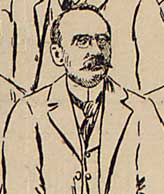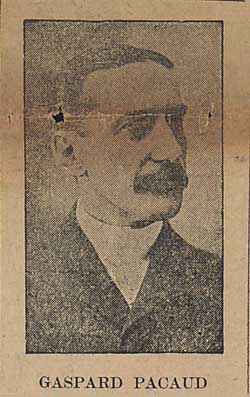 |
|
|
|
|

Brothers Aurèle and Gaspard Pacaud
were born in Saint-Norbert, a town in the Arthabaska region of Quebec. They
came to Windsor in 1881 to found a weekly newspaper in this long-established
French-Canadian community. In spite of their owning a newspaper and being
very public figures, facts about the Pacaud brothers are not easy to come by
in Windsor’s historical record. In order to better paint their picture and
to fully understand their mission in coming to South-Western Ontario, it is
quite instructive to turn the spotlight on other members of their family.
Aurèle and Gaspard were members of an illustrious and influential family in
their home province. Their father, Philippe-Napoléon Pacaud, was a famous
Patriote in the 1837 Rebellion. Notary public and bank director, he founded
and led the Fils de la Liberté in Sainte-Hyacinthe and became commissioner
general of the patriot army when the Rebellion broke out. Two of his
brothers were also heroes of the Rebellion.
Philippe-Napoléon was jailed for
a few months in 1839 and, upon his release, established himself in the town
of Saint-Norbert in an area newly-opened to colonization. There held a
number of prestigious positions, among which justice of the peace,
postmaster and militia captain. Among his circle of friends were to be found
famous writers like Louis-Honoré Fréchette and important politicians like
Wilfrid
Laurier
Another one of Philippe-Napoléon’s sons, Ernest, is much better known than
his brothers, and what we know of him can help us reconstruct the careers of
Aurèle and Gaspard. Even his early life throws light on Gaspard and Aurèle’s
background : Ernest attended an English school in Trois-Rivières before
pursuing classical studies at the Séminaire de Québec. He became a lawyer
and assumed his place in Saint-Norbert’s high society. The Pacaud residence
was a centre of “red” ideas. Ernest was a close personal friend of Wilfrid
Laurier; in fact, it was at his prompting that the future prime minister
first entered provincial politics in 1871. In 1877, Laurier convinced Ernest
to establish a newspaper in Arthabaska, La Concorde. The paper was Liberal,
but sought to unite moderates from all political parties. In 1880, Laurier
and his backers founded a new paper in Quebec City, L’Électeur, and named
Ernest editor-in chief. The paper’s mission was to create a coalition of
moderate Liberals and Conservatives by undermining the right-wing
Conservatives associated with the Ultramontaiste and Cercle Catholique
clique in Quebec. It hardly seems coincidental that, one year later, two
other members of the Pacaud family show up in Windsor to found a paper with
exactly the same methods and purpose as L’Électeur.
Despite accusations of fraud and disputes with the clergy,
Ernest
maintained his position as one of the main Liberal party organisors and as
Laurier’s chief counsellor even after the latter moved onto the federal
stage.
The Liberal party needed a base in Ontario and it was in a bilingual area
like Windsor that it would have the best chance of success. Thus were Aurèle
and Gaspard sent to Windsor. (A fourth brother, Horace, founded yet another
French newspaper in Bay City, Michigan, where there was another large
concentration of French-Canadians.) We can glean more details of the Pacaud
family and its extensive networks by reading the obituary for Aurèle and
Gaspard’s mother, published in 1898
 .
.
Aurèle Pacaud
We know very little about the man who was owner and publisher of Le Progrès.
Gaspard’s older brother, he married Charlotte-Emma Drumoulin in
Arthabaskaville in 1870. He owned some sort of business there before coming
to Windsor in 1881. He seems to have been a lawyer, like many others in his
family. We know he had a son, Benjamin, who survived a murder attempt in
Windsor in 1891
 ;
Ben was also a store-owner in Windsor ;
Ben was also a store-owner in Windsor
 . If we
can believe some of Aurèle’s enemies, he was not always scrupulously honest
in his business dealings . If we
can believe some of Aurèle’s enemies, he was not always scrupulously honest
in his business dealings
 . But what cannot be denied is that under his
sure hand, Le Progrès managed to stay ahead of the competition in Windsor
for over thirty years. We have only two pictures of Aurèle Pacaud : he
appears in a print of a local political committee in 1902 . But what cannot be denied is that under his
sure hand, Le Progrès managed to stay ahead of the competition in Windsor
for over thirty years. We have only two pictures of Aurèle Pacaud : he
appears in a print of a local political committee in 1902
 ; a later
photo accompanied the obituray which appeared in
The Border Cities Star in
1922 ; a later
photo accompanied the obituray which appeared in
The Border Cities Star in
1922 |
 Aurèle Pacaud |
Gaspard Pacaud
A few months after his defeat, Gaspard became a notary public, like his
father before him
 ,
,
 . In 1892, he left his position as
editor-in-chief for Le Progrès
. In 1892, he left his position as
editor-in-chief for Le Progrès
 and became licence inspector for hotels in the Essex North district
and became licence inspector for hotels in the Essex North district
 ,
,
 .
He no doubt kept a financial interest in the newspaper, which also ran a
flourishing print shop
.
He no doubt kept a financial interest in the newspaper, which also ran a
flourishing print shop
 ,
,
 . He also worked as an insurance agent with an office in the
Davis building on Sandwich Street East (modern-day Riverside Drive). Gaspard
was obviously a prominent member of Windsor’s business establishment, as he
had the means in 1895 to build himself
an imposing residence in the city’s
fashionable high-class neighbourhood on Victoria Street. In
1902, he was able to advertise his services as a money-lender
. He also worked as an insurance agent with an office in the
Davis building on Sandwich Street East (modern-day Riverside Drive). Gaspard
was obviously a prominent member of Windsor’s business establishment, as he
had the means in 1895 to build himself
an imposing residence in the city’s
fashionable high-class neighbourhood on Victoria Street. In
1902, he was able to advertise his services as a money-lender
 .
.
In spite of a full slate of business activities, Gaspard did not neglect his
political and cultural commitments. He continued to contribute regularly to
Le Progrès, and and maintained a busy schedule as guest speaker for
various events
 . He was president of the Saint-Jean-Baptiste Society for
Saint-Alphonsus parish
. He was president of the Saint-Jean-Baptiste Society for
Saint-Alphonsus parish
 and also head of Windsor’s separate school
board. As befits the founder of a newspaper named Le Progrès, he held
many progressive ideas, such as universal suffrage for women
and also head of Windsor’s separate school
board. As befits the founder of a newspaper named Le Progrès, he held
many progressive ideas, such as universal suffrage for women
 . In 1890, he
married Annie McKewan, an English-speaking Protestant from Bay City Michigan
. In 1890, he
married Annie McKewan, an English-speaking Protestant from Bay City Michigan
 ;
no doubt this is what led him to write a rebuttal to a sermon given in his
home parish condemning mixed marriages
;
no doubt this is what led him to write a rebuttal to a sermon given in his
home parish condemning mixed marriages
 . He died in Windsor on
August 28, 1928.
. He died in Windsor on
August 28, 1928.
According to Aurèle Pacaud’s obituary in The Border City Star, Le Progrès
stopped publishing around 1919, although other writers have suggested both
earlier and later dates. Our own collection ends in 1902 and very few later
issues have survived elsewhere. It is therefore difficult to evaluate the
later years of Le Progrès. But it is apparent from
Gaspard’s obituary (Border Cities Star), that the Pacaud
brothers were a major force in the development of the local French-Canadian
community. It is also clear that their influence did not limit itself to
their own linguistic community but indeed had an effect on all areas of
public life in Windsor in a period stretching from the post-Confederation
era to the First World War.



